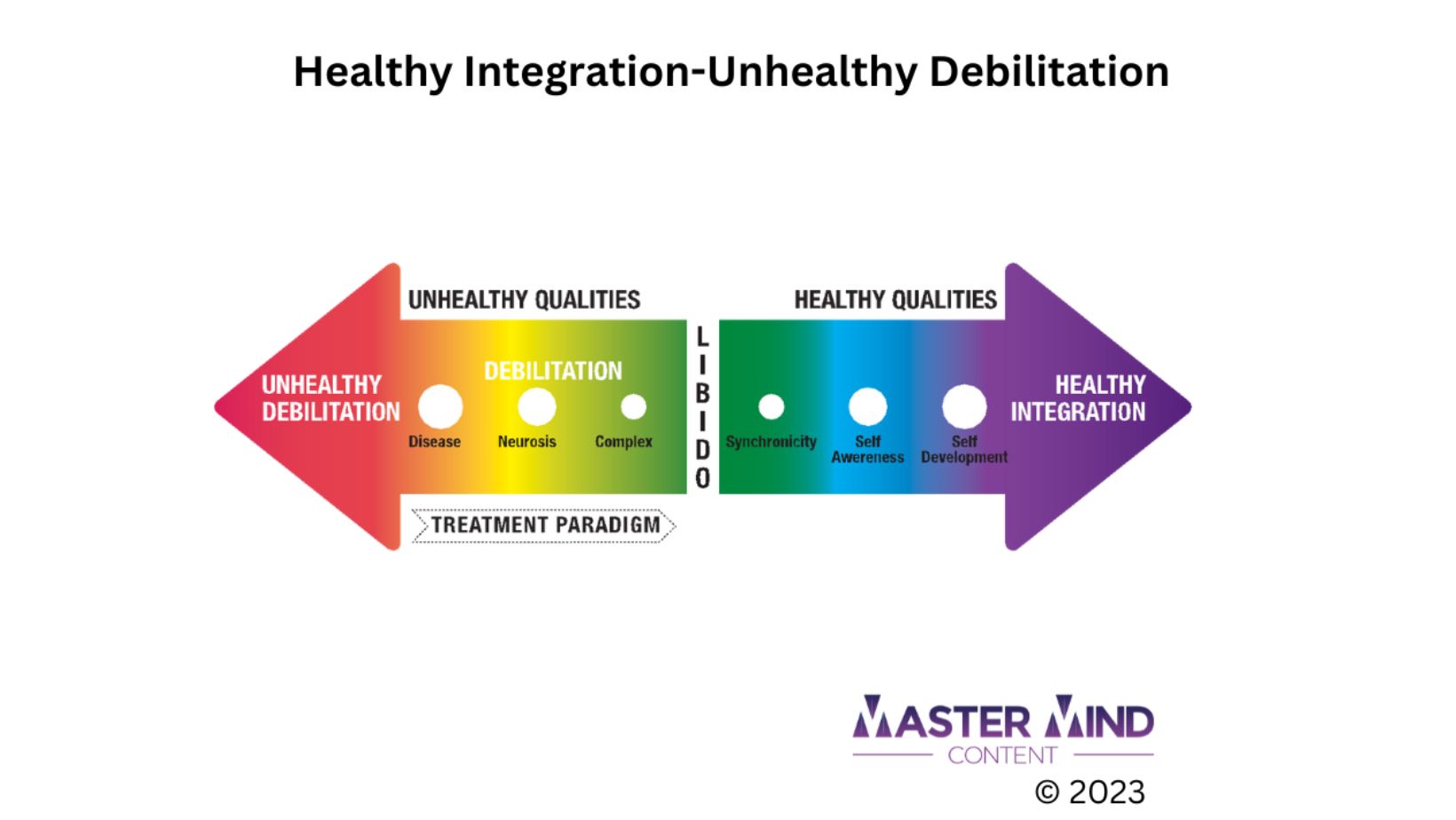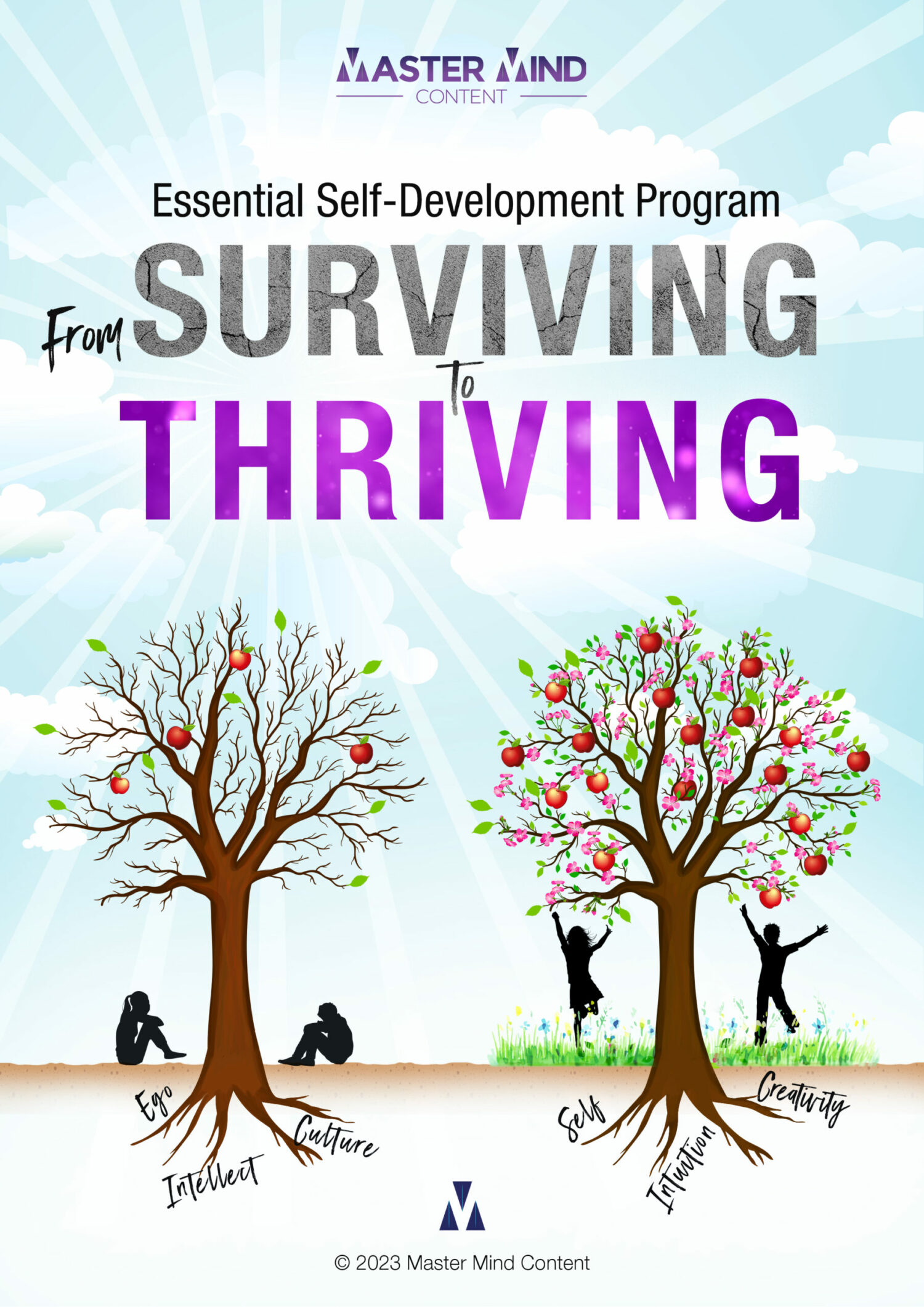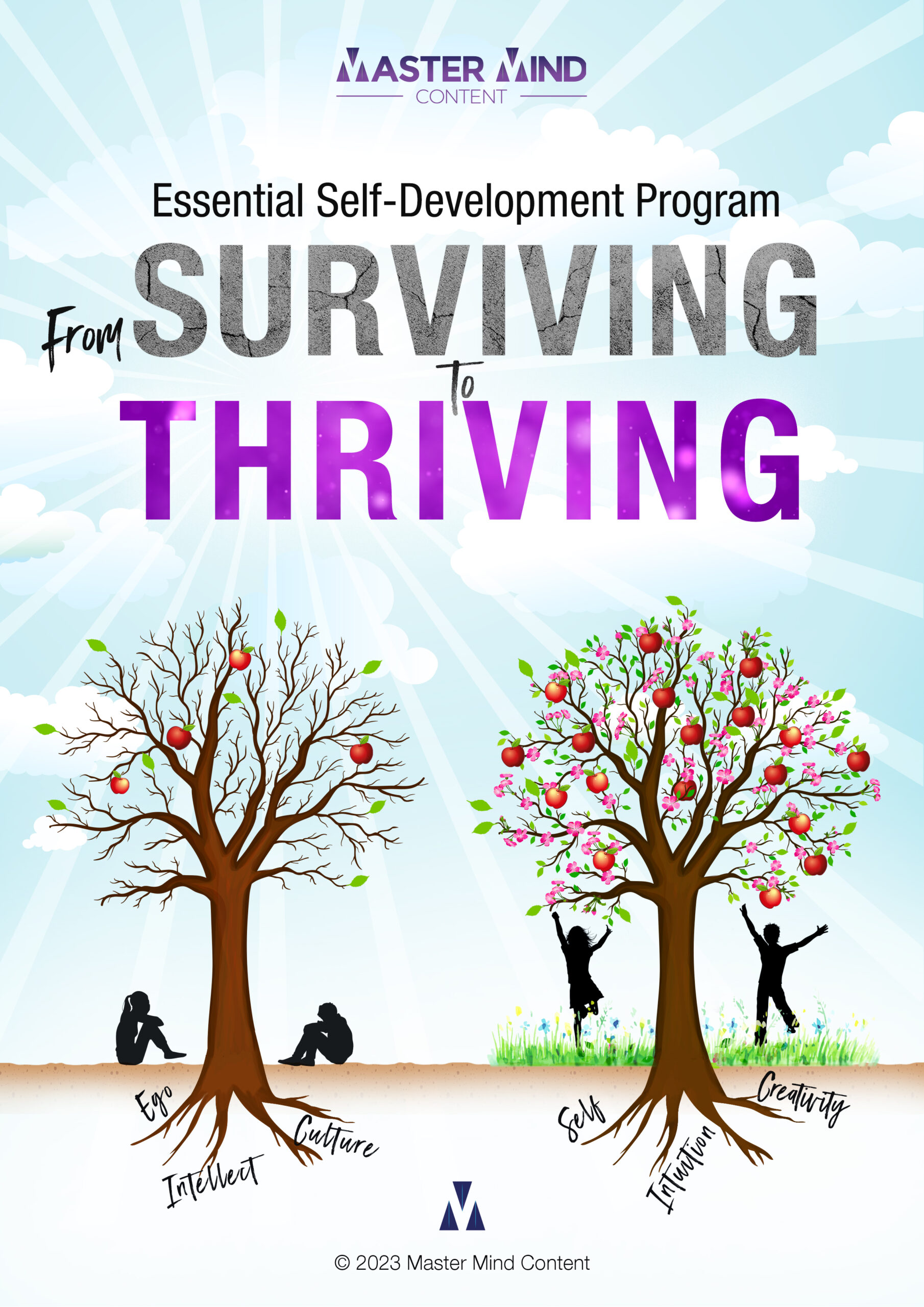Fragmentation is another way of saying that the conscious personality is fractured. The psyche becomes fragmented when part of your True Nature is split off and repressed, suppressed, ignored or forgotten by the conscious mind.
Consciousness is split off when you experience a “trauma”. [1] A “trauma” does not necessarily have to be a dramatic or devastating event. It can simply be an experience that has a negative effect on your emotions.
For example, emotional traumas are a common occurrence in children who experience emotional neglect or when they’re reprimanded for expressing part of their True Nature that is not considered “acceptable” by society.
A well-established conclusion in today’s psychology communities is that conscious aspects of an individual’s nature are easily dismembered because culture tries to “civilise” children into how society deems human beings should behave, but in doing so we cut off aspects of our animal nature instead of learning how to bring natural instincts under control.

When consciousness is cut off, the ego disassociates with the part of your personality that is deemed unworthy or unacceptable [2]. However, the split-off aspect of your personality still has autonomy by way of a complex or neurosis.
Thought-Provoking Quote
“Every split-off portion of libido, every complex, has or is a (fragmentary) personality. At any rate, that is how it looks from the purely observational standpoint. But when we go into the matter more deeply, we find that they are really archetypal formations. There are no conclusive arguments against the hypothesis that these archetypal figures are endowed with personality at the outset and are not just secondary personalizations. In so far as the archetypes do not represent mere functional relationships, they manifest themselves as personal agencies. In this form they are felt as actual experiences and are not “figments of the imagination,” as rationalism would have us believe. Consequently, man derives his human personality.”
~ Carl Jung, Symbols of Transformation [3]
To avoid confusion, it should be noted that some therapists use the term “dissociation” in a broad sense rather than referencing the fragmentation of the personality. This can cause confusion because “symptoms of dissociation” are typically classed as dysfunctional disorders which include madness, feeling disconnected from the world, severe memory loss, uncertainty about who you are and multiple personalities.
Fragmentation does not mean that you are crazy or schizophrenic. In general, however, it does indicate that you are likely to develop a complex or a neurosis. In severe cases, a fragmented psyche becomes psychosis.
In most instances, fragmentation is initially caused in childhood. When you were reprimanded as a child, simply for being a child, it caused consciousness to become split off. At the same time, an emotional wound opens.
However, the psyche can continue to become more fragmented as life goes on. Unless the wound is healed by means of a compensatory factor, a fragmented aspect of your personality can become increasingly toxic and cause further fractures in other parts of your psyche.
For example, you may lack self-esteem which makes you insecure in relationships, but at the same time, you have an adequate degree of self-confidence to successfully function in social settings.

However, your lack of self-esteem is a toxic energy that surfaces as jealousy and prompts you to create a conflict with your partners. Eventually, the relationship ends because your partner can’t cope with your histrionics and accusations.
Over time, the self-confidence you once had erodes and you lose the part of your personality that enabled you to function well in social settings.
Losing part of the personality means it sinks into the unconscious where it is either suppressed, forgotten or ignored.
Two of the leading thinkers in the field of depth psychology, Sigmund Freud and Carl Jung noted that unresolved aspects of the personality initially show up as a complex [4], and then a neurosis [5].
Thought-Provoking Quote
“This factor has to be reckoned with in very many cases, perhaps in all severe cases of neurosis. In fact, it may be precisely this element in the situation, the attitude of the ego-ideal, that determines the severity of the neurotic illness… the sense of guilt expresses itself under different conditions.”
~ Sigmund Freud, The Ego and the Id [6]
Dismemberment causes the conscious personality to become fragmented. Psychologically speaking, the ego deems the side of your nature that is not accepted by people in the external world to be worthless and discarded.
However, that is not the case. Oftentimes, the aspect of your personality that is pushed into the unconscious has key qualities you need to function to the height of human capacity.
Thought-Provoking Quote
“It is also astonishing to find that some very good characteristics turn up in the shadow. Generally, the ordinary, mundane characteristics are the norm. Anything less than this goes into the shadow. But anything better also goes into the shadow! Some of the pure gold of our personality is relegated to a shadow because it can find no place in that great levelling process that is culture.
~ Robert Johnson, Owning Your Own Shadow [7]
When the psyche is in a fragmented state, an internal conflict exists between the ego and the Self which is subsequently projected into the outside world. It shows up in your moods, attitudes, behaviours, idiosyncrasies and emotions.
A fragmented personality causes chaos and destruction in your life. And the more you refuse to deal with these inner conflicts the more you suffer. We could argue that our fragmented societies are a reflection of the fragmented personalities of individuals.
Thought-Provoking Quote
“Fragmentation is now very widespread, not only throughout society, but also in each individual; and this is leading to a kind of general confusion of the mind, which creates an endless series of problems and interferes with our clarity of perception so seriously as to prevent us from being able to solve most of them.”
~ David Bohm, Wholeness and the Implicate Order [8]
This was always bound to happen voting psychopaths into power.
Civilisation and culture may have a lot to answer for in the complexes, neuroses and psychosis of the human race.
Fragmentation leads to a wide range of negative and destructive behaviours that have been shaped into coping mechanisms developed for the ego to keep your emotional survival intact.
The more fragmented you are, the more complexes, and thus destructive behaviours you have. This is what the church means when they say someone is possessed by the devil.
Thought-Provoking Quote
“The more “complexes” a man has, the more he is possessed; and when we try to form a picture of the personality which expresses itself through his complexes we must admit that it resembles nothing so much as an hysterical woman—i.e., the anima! But if such a man makes himself conscious of his unconscious contents, as they appear firstly in the factual contents of his personal unconscious, and then in the fantasies of the collective unconscious, he will get to the roots of his complexes, and in this way rid himself of his possession. With that the anima phenomenon comes to a stop.”
Carl Jung, CW 7, Two Essays on Analytical Psychology [9]
However, a fragmented psyche does not necessarily mean you have to continue to live with destructive complexes. You can use them to identify which archetypes are causing conflict in your life and why.
Once you understand the motivation behind a conflict (self-awareness), you are in a better position to integrate it into your conscious personality (self-mastery).
A complex is an autonomous personality that displays a set of patterns of emotions, memories, perceptions, and wishes that surface in response to your environment.
Everyone likely has some form of complex, but it doesn’t always stand to reason that your complex is triggered by the same experience as somebody else.
However, complexes do share a common, or archetypal, emotional pattern. For example, an inferiority complex is synonymous with a lack of self-esteem and the perception that you are inadequate, unlovable or incompetent. [10]

Jung viewed complexes as “autonomous personalities” that take possession of the ego and influence your life as if they had a life of their own. [11] The Swiss proposed that complexes are “archetypal formations” which invade the conscious personality.
The Swiss noted that an autonomous complex is only partially conscious because the ego only associates with it under certain conditions — a trigger in the external world that is fuelled by an underlying motivation belonging to an underdeveloped archetype.
Another way of looking at a complex is to say it’s a state of conscious awareness that you know you are experiencing and even decided you were going to perform a specific action; i.e. I am going to smoke a cigarette.
However, you may not be consciously aware of the underlying drive that makes you do the thing you do. You may think you are aware, but you’re actually only aware of the action you’re performing and not the reason.
A complex is basically a coping mechanism that serves as a function when you’re in survival mode. But what is the underlying cause that makes you want to smoke a cigarette?
Observing your thoughts, actions and behaviours to recognise your archetypal patterns guides you to the underlying motivation. The archetypes also provide you with the solution to heal the wound and dissolve the complex.
Complexes can just as easily prompt you to act out of character. Expressions like “I don’t know what came over me” and “I was out of my mind” are examples that an archetype was at play.

Archetypal energies emerge to take the place of a dismembered part of your personality that has not been integrated into conscious awareness.
Jung linked complexes with the personal unconscious (subconscious programs) but indicated that archetypal energies project from the Superconscious onto the conscious mind whenever there is a corresponding energy in the outside world.
Thought-Provoking Quote
“We can hardly get round the hypothesis that an emotionally charged content is lying ready in the unconscious and springs into projection at a certain moment.”
~ Carl Jung, CW9 Part 1, The Archetypes and the Collective Unconscious [12]
So that begs the question, how does a fragment of your personality become split off?
The 19th Century French psychologist and physician Pierre Janet is credited with being the first Western philosopher to make the connection between “disassociation” and traumatic memory. [13]
In the preceding quarter of a century, the effects of fragmentation caused by repression were advanced by Freud and Jung.
Repression occurs when parents, teachers, siblings and peers deem certain aspects of your nature unacceptable. For example, anger, moodiness, disobedience etc, are criticised by parents, teachers and peers despite them being innate aspects of human nature.

Because you want to be liked, appreciated, accepted and loved, you learn from an early age to repress the aspects of your nature that are deemed unacceptable.
The parts of your nature that are deemed unacceptable are then forced out of the conscious mind — they are expelled from paradise. However, repression also causes the personality to become split in two and can become even more fragmented as time goes by.
As a result, unconscious content creates conflicts so that its presence is drawn to the attention of the ego. When the ego associates with a certain archetypal quality it is given space in the light of the conscious mind.
However, as mentioned above, ego association doesn’t necessarily mean that you are consciously aware of why a particular aspect of your nature is prompting you to behave in a certain way.
Thought-Provoking Quote
“We have more than one personality inside us. Once we can understand this and accept it, it will give us much more control over our own lives and our own destiny.”
~ John Rowan, Discover Your Subpersonalities [14]
Repressed aspects of the personality ultimately mean that your conscious personality is not whole. All the qualities that belong to humankind are not wholly (holy) available to your ego—conscious awareness.
So it is interesting to note that the word whole and the word health have the same root word; hal. To be whole is to be healthy. To be fragmented is to be unhealthy.

When you repress or suppress emotions they are not given life. And when they are not given life, they rebel. When they rebel you experience inner conflicts and emotional pain and suffering.
Moreover, you do not give yourself the opportunity to develop a personality that is constructive, balanced and emotionally stable.
Consciousness has to be experienced before you can develop archetypal energy. It is through the development of archetypal energies that you cultivate balance.
Thought-Provoking Quote
“The animus or anima may take possession of us, driving us to creative work, or they balance our natures, leading us into participation in and integration of other-than-ego qualities, thereby creating new configurations of ego identity and otherness.”
~ Gareth Hill Ph.D, Patterns of Immaturity and the Archetypal Patterns of Masculine and Feminine [15]
Question: So how do you recognise when part of your personality is fragmented and unbalanced?
Answer: By observing the complex associated with a specific archetypal energy.
Remember, the Superconscious wants to thrive. It needs to be given expression. When consciousness is repressed and ignored it tries to make itself known as an autonomous complex (depression, anxiety, OCD etc).
Consequently, your worldview also becomes fragmentary — you think and act in ways that are convenient, known and safe. It keeps you in your bubble of comfort where you know you can survive.

The ego cherishes predictable outcomes that measure up to your worldview regardless of the fact that coping mechanisms have potentially harmful effects on your health and relationships.
But the ego responds to subconscious programs. And fragmentation is caused subconsciously.
Thought-Provoking Quote
“Man thus obtains an apparent proof of the correctness of his fragmentary self-world view though, of course, he overlooks the fact that it is he himself, acting according to his mode of thought, who has brought about the fragmentation that now seems to have an autonomous existence, independent of his will and of his desire.”
~ David Bohm, Wholeness and the Implicate Order [16]
It, therefore, makes sense for you to upgrade subconscious programs that allow more aspects of your fragmented personality to be brought into the light of the conscious mind and integrated into the conscious personality.
The goal of the Essential Self-Development Program is to recover the split-off aspects of consciousness and integrate healthy qualities that develop constructive aspects of your personality. This involves either deflating the inflated ego or developing the underdeveloped ego.
To learn more about how archetypes inflate the ego and how fragmentation weakens the ego, read the article: What is Ego-Inflation and How Does It Happen?

[1] Janet P, Psychological Automatism: Essay on the Experimental Psychology of the Inferior Forms of Human Activity (1889)
[3] Carl Jung, Symbols of Transformation
[4] Carl Jung, CW7 Two Essays on Analytical Psychology, para 438, (1928)
[5] Sigmund Freud, The Ego and the Id, p.8 Kindle Loc 104 (1923)
[6] Sigmund Freud, The Ego and the Id, p. 45, Kindle Loc 655 (1923)
[7] Robert Johnson, Owning Your Own Shadow, p. 7 Kindle Loc 71 (1991)
[8] David Bohm, Wholeness and the Implicate Order, p.1 (1980)
[9] Carl Jung, CW 7, Two Essays on Analytical Psychology, para 387 (1928)
[10] Low self-esteem: a refined cognitive behavioural model, K.A. Rimes et al, CUP (2023)
[11] Carl Jung, CW7, Two Essays on Analytical Psychology, para 312 (1928)
[12] Carl Jung, CW9 Part 1, The Archetypes and the Collective Unconscious, 2nd ed, para 134 (1968)
[14] John Rowan, Discover Your Subpersonalities, p.4 (1993)
[15] Gareth Hill Ph.D, Patterns of Immaturity and the Archetypal Patterns of Masculine and Feminine, p.35 (1978)
[16] David Bohm, Wholeness and the Implicate Order, p.3, (1980)
A key goal in life is, or should be, to become self-actualised. This is a term that originated from renowned psychologist Abraham Maslow’s theory of human motivation.
Maslow defined self-actualisation as the:
Thought-Provoking Quote
“…ongoing actualisation of potentials, capacities and talents, as fulfilment of mission (or call, fate, destiny, or vocation), as a fuller knowledge of, and acceptance of, the persons intrinsic nature, as an unceasing trend toward unity, integration of synergy within the person)”.
~ Abraham Maslow: Toward A Psychology Of Being [1]
Moreover, Maslow believed that striving towards an actualised state of being is a necessary requirement for growth, fulfilment and satisfaction. He hypothesised that our outlook on life, and subsequently, our state of mind is correlated with whether our needs and drives are met.
Our basic needs relate to physical survival; food, water, shelter and safety. These need to be met first. Then we strive to achieve social connection and self-esteem. Once all of these goals are met, we move on to seeking self-actualisation—or achieving our full potential.
Thought-Provoking Quote
“Preserving oneself and reaching out for fulfilment, for excitement and for enlargement. I have tried to express this as a contrast between living fully and preparing to live fully, between growing up and being grown”.
~ Abraham Maslow: Toward A Psychology Of Being [2]
Later, an additional need was added—contributing something purposeful that is greater than ourselves. This is also referred to as “Beyond Self-Actualization,” “Transcendence,” or “Selfless Actualization”. [3]
In short, self-actualisation involves transcending the external needs of the ego and integrating fragmented parts of your personality that have been repressed. Once the foundations of your personality are in place – self-esteem, confidence and love – you can move from surviving mode into thriving mode.
Maslow suggested that basic needs are “deficit needs” or D-Love which stands in opposition to what he labelled B-Love — a process of being. It is in the latter dynamic that we are self-actualised or moving towards self-actualising.
To give you some idea, Maslow defined B-love as feeling love for another person without needing anything in return, a selfless love which augurs unselfish acts.
When we behave from a base of D-Love, on the other hand, a deficiency exists which creates love needs; affection, acknowledgement, appreciation etc. This is a state of being associated with the unhealthy traits of the Caretaker which I described in the Caretaker Part Two | Archetypes Explained series on YouTube.
<<<<Watch by clicking in the video below>>>>
As I mentioned in The Caretaker Part 2 video, you can identify if you have deficiency needs if you are a people pleaser (as opposed to a pleaser of people which is a healthy psychology).
The unhealthy Caretaker shows up in individuals that have low self-esteem which drives an unconscious lack of self-respect. In this stage of conscious awareness, you are stuck in survival mode.
More precisely — emotional survival! The ego protects your emotional survival.
Self-actualisation and beyond promote “growth needs.” In this stage of conscious awareness, you transcend survival instincts and become attuned to thriving.
Ironically, thriving can be driven by the need to survive. We are often more motivated when we are at our most desperate. It is a question of sink or swim.

Individuals with a healthy mindset fuelled from a loved-based centre will learn to swim. If your mind is operating from a fear-based centre, you’re more inclined to sink.
Anxiety is a sign that you are in a situation that you need to survive. Chronic anxiety is an indication that you are having difficulty learning to swim. If you fall into depression, you are literally drowning in the sea of your unconscious.
You are being overwhelmed by the energies of your repressed emotions.
If you want to survive in this life, you have to thrive. Fuck emotional survival. Unless you take uncomfortable action and expose yourself to experiences that make you feel vulnerable you will never grow.
You learn how to swim by jumping into the pool. The ego needs life experiences to learn how to live. The more situations you find yourself in, the more developed and whole you become.
Studies show that personal growth is considered to be a crucial precursor to well-being [4] There is also growing evidence to show that neglecting self-development leads to neuroses such as anxiety and depression. [5] It also increases your risk of disease. [6]

When you experience a complex or the symptoms of a neurosis, it is important to recognise them as the emergence of consciousness. This type of complex or neurosis can be classified as the emergence of an archetypal energy that is hidden from conscious awareness.
Once the emerging archetype comes into conscious awareness, you are in a position, and responsible for integrating the energy into your personality. In other words, you program the ego to relate to the external world.
You learn how to swim.
Thought-Provoking Quote
“Every archetype is capable of endless development and differentiation. It is therefore possible for it to be more developed or less…”
~ Carl Jung, CW 12, Psychology and Alchemy [7]
When the conscious mind recognises and acknowledges the emerging quality surfacing from the unconscious — which Jung calls an archetype — you move towards self-actualisation, or what Jung called individuation.
Thus the archetypes play a central role in identifying the emergent qualities of your personality. They are reflected in the thoughts, actions and behaviours of the ego. They are recognised in complexes, neurosis and disease.
Researchers indicate that thinking in black-and-white terms, results in missed opportunities to learn, grow, and experience things that could bring more meaning to our lives. Self-actualisation involves being open to alternative information and points of view. [8]
An individuating approach to life involves looking at problems in creative ways and from different perspectives. This requires you to be more open to engaging in different experiences — even when your ego is afraid or anxious. [Hero]
Anxiety arises due to a fear of loss, failure, disappointment or rejection. In some people, these fears prevent you from engaging in life altogether. A strategy to overcome this is to relinquish the desire or expectation of an outcome.
If there is no desire, there is no fear.

If you aim to become your best self, get clear on your values, principles and life goals [9]. When you strive to reach goals that go against your values or morals, you betray yourself.
Self-betrayal leads to a lack of fulfilment, dissatisfaction and unhappiness. Maslow theorised that betrayal is linked with being disappointed in yourself which he related to “intrinsic guilt”.
Thought-Provoking Quote
“Intrinsic guilt is the consequence of betrayal of one’s own inner nature or self, a turning off the path to self-actualisation, and is essentially justified self disapproval.”
~ Abraham Maslow: Toward A Psychology Of Being [10]
Mainstream psychologists relate self-actualisation to “esteem needs” [11]. For example, a yearning for love and belonging or for success in a career.
There is nothing at all wrong with striving for love or success to build self-esteem. In fact, according to mainstream psychology, we need to satisfy these needs before moving on to self-actualisation.
But, in my experience, and therefore, in my opinion, nurturing self-esteem is part of the process of self-actualisation. It is a foundational element that gives you the emotional stability to pursue higher goals.
To nurture self-esteem, you first have to accept the way you are now. Acknowledge, that you have weaknesses that can be transformed into strengths. Observe when your behaviours are driven by deficiency needs or a fear-based centre. Accept they exist, and find a solution.
Solutions can be inspired by the archetypes tool in the Master Mind Content Self-Development Program. There is no single solution that I can offer here because the solution is determined by the emerging archetypal energy and your individual preference.

One of the reasons that you might feel anxious and potentially become depressed, restless or unhappy is because the nervous system represses aspects of your personality.
But the reason this happens is because culture determines how we should behave; and what is accepted and not accepted. Fuck cultured civilisation and “masters” telling you how to behave at any given moment. Express yourself as you see fit. Just don’t break any justified laws like killing and stealing.
What you need to do is express your True Nature in ways that you feel are fitting for the situation. But you also have to honour your instincts and don’t suppress them when they surface.
This can present you with a balancing act at times, especially if an unconscious energy that has been repressed projects onto the conscious ego and throws you into a moment of madness.
But in my experience, this type of overwhelming projection is rare. You know you have these moments, but they don’t happen very often. Therefore it should be safe for you to be authentic and honour archetypal energies when they arise.
This is what it means to be self-directed (Ruler). Being self-actualised doesn’t mean that you suddenly become enlightened like Buddha or Jesus. Becoming whole may not even lead to enlightenment.
But it does lead to positive physical and mental health outcomes. It does lead to happiness, fulfilment, satisfaction, love, peace and wisdom.
Archetypal energies are powerful tools that help determine which unconscious energies are trying to break through into your conscious thinking.
Master Mind Content has developed a self-development program that shows you how to recognise archetypal energies and adjust your thoughts, actions and emotions accordingly. With these tools, you will be able to release repressed consciousness, develop your personality and upgrade your subconscious programs with energies that deliver a better quality experience of life.
[1] Abraham Maslow: Toward A Psychology Of Being, p.29, Kindle Loc 512, (1962)
[2] Ibid, p.35 Kindle Loc 633, (1962)
[7] Carl Jung, CW 12, Psychology and Alchemy, para12, (1968)
[9] Ibid
[10] Abraham Maslow: Toward A Psychology Of Being, p.161, Kindle Loc 3200 (1962)
Clinical research shows that abandonment issues are a significant contributor to anxiety and depression. If you were abandoned physically or emotionally as a child, the chances are that abandonment issues are an underlying demon lurking behind your anxiety and depression.
Trust issues and feeling insecure in relationships are also outcrops of abandonment. A surefire way to identify whether you have abandonment issues, however, is if you’re in a toxic relationship but you are too afraid to end it. [1]
That is a fear of abandonment staring you right in the face!
You can also abandon yourself. If you don’t trust yourself, or repress parts of your personality that you believe are not acceptable, you’re abandoning your True Self and pushing aspects of your personality into the shadow. [2]

You also abandon yourself by adopting other people’s preferences, beliefs and ideas just to fit in. This is something I was guilty of as a teenager. I was emotionally abandoned by my parents and my sibling sister.
The reason why individuals with abandonment issues adopt this type of behaviour is because they have a desperate need to fit in. To feel as though you belong to part of a group. You want to feel accepted and appreciated.
If you have abandonment issues, you may also notice that you attach too quickly in a relationship and want your declaration of love to be reciprocated by your partner early in the relationship.
You are probably also a people-pleaser, doing things for other people because you want to be liked and accepted. In intimate relationships, you will go out of your way to make the other person happy even at your own expense — such as staying in a toxic relationship because you don’t want to hurt the other person. Or at least that’s what you tell yourself.
Comfort, compassion and understanding are basic human needs that instil emotional security and psychological stability in children. Without this emotional support, children learn to repress the parts of their personalities that are deemed unworthy.
In the Master Mind Content archetypes tool, you will notice that many of the emotional issues experienced by people with abandonment issues show up in the wounded categories for the Everyman and the Creator. Both these archetypes are associated with the Greek god Hephaestus.
Hephaestus is born with a deformity and subsequently dismissed from Olympus by his parents. Hera did not think her lame son was fit to be a god. This was the first time he was abandoned.

This myth shows us that a deformity is not acceptable in the realm of supreme conscious awareness — of “civilised” beings. This is analogous to you behaving in a manner that is not acceptable to your parents or civilised society when you were a child.
But a child’s behaviour is merely instinctive. It is your animal nature. Men are considered animals, not gods. Only men who can control their animal nature can be considered a god, thus the deformed Hephaestus was not considered not fit to be a god,
In another myth, Hephaestus is dismissed by his father, Zeus for not siding with him during an argument. Zeus, the King of the Gods, is synonymous with the Supreme Self, the mind, both the conscious mind and the Superconscious.
This myth shows us how we can become separated from our True Nature when we do not obey the Self — Freud’s superego. As Jung shows, when the Self is repressed — ignored, forgotten, unheard — a complex develops.
A complex shows us that we are one-sided and imbalanced. In the two myths of Hephaestus, the deformed god can be viewed as an imbalance.
According to attachment theory, my psychological development aligned with both anxious-ambivalent attachment and anxious-avoidant attachment.
Abandonment issues usually develop in children who are disciplined for expressing emotions that are considered “unacceptable behaviour”. Subsequently, you learn to repress your emotions.

Children who are dismissed and/or ridiculed by their parents instead of receiving emotional support can also feel abandoned by their parents.
Other symptoms that are prominent in people with abandonment issues are feelings of rejection, loss, and hopelessness. When someone experiences abandonment, it can lead to a sense of disconnection from yourself and isolation from others.
In some cases, the fear of abandonment can become a pervasive and debilitating anxiety. This is observable in individuals who withdraw from relationships or avoid emotional intimacy altogether.
However, isolation and lack of support typically exacerbate feelings of depression which debilitates the individual even more. If you fall into the pit of depression, you lose the energy and inclination to engage with life altogether. Subsequently, your social life and career suffer.
Individuals who show symptoms of abandonment usually engage in negative self-talk. You may also harbour beliefs that you are not worthy of love or attention. These beliefs can be conscious or unconscious.

Such negative beliefs generally contribute to low self-esteem and feelings of guilt and shame. Ultimately, these symptoms lead to increased levels of anxiety and depression.
Abandonment issues can occur as a result of a variety of experiences or circumstances. The following list is the most common causes of abandonment issues:
Abandonment issues can stem from childhood experiences, such as neglect, and physical or emotional abuse. The loss of a parent [2] through divorce, death, or separation has been linked with abandonment issues.
Children who experience separation because the primary caregiver (usually the mother) is physically or emotionally absent, can feel rejected and unlovable. Likewise, if interactions with the primary caregiver are negative or unpredictable, life becomes too stressful.
To cope, the brain devises mechanisms such as disassociation and avoidance tactics. If negative emotions are unregulated, feelings of abandonment persist into adulthood and can affect your relationships and sense of well-being.
Children who are abandoned feel betrayed. They grow up believing that nobody loves them and the world is a lonely place to be. Feelings of betrayal become a lack of trust, martyrdom and a victim mentality emerges.
When this happens, you typically overstretch yourself by doing things for others. You do this because you want to be liked. But eventually, taking on other people’s burdens gets too much and resentment kicks in.

When you feel betrayed, you may also feel humiliated. Individuals with an underdeveloped psyche will seek revenge on the people they feel have betrayed them. They do this in various ways, either by trying to humiliate them or hurt them physically or emotionally.
Traumatic experiences, such as sexual assault, domestic violence, war, or displacement can cause feelings of abandonment. The result is a lack of trust in your caregivers and authority in general which surfaces as feelings of betrayal and disconnection from others in later life.
Experiencing rejection, whether it be in romantic relationships, your peers, siblings, parents, or other social groups, can trigger feelings of inadequacy. Here we see the roots of a lack of self-worth and feelings that you are not loveable start to grow.
Individuals who do not feel they fit in with their peers or social groups typically develop feelings of abandonment and rejection. An underlying condition develops that unconsciously informs you “I do not belong here.”

When individuals lack a sense of belonging they tend to become socially isolated and struggle to connect with others on a meaningful level. This gives rise to loneliness and a fear of rejection [3]. The need to belong is a core psychological need.
Moreover, the “need to belong” has been observed at both the neural and peripheral biological levels [4]. Subsequently, belonging-related stressors intensify and you become defensive to protect your emotional wellbeing – which accounts for irrational responses such as moodiness, outbursts of emotion and a tendency to try and humiliate others.
Unless creative types are in an environment where their imagination is appreciated, it can be very easy for individuals to develop a sense of not belonging.
As a creative introvert, I didn’t feel as though I fitted in with my peers. Because I went along with what they liked to do even though I didn’t, I abandoned myself. When I did start to find things that interested me, my friends ridiculed me for being different.
Major life transitions, such as moving to a new city, changing jobs, or ending a relationship, can trigger feelings of uncertainty about the future. If you already have abandonment issues from one of the causes mentioned above, these feelings can persist and cause you to become paranoid.
Paranoia can lead to a lack of trust, anxiety and fear. You may start withdrawing from society altogether and isolate yourself from others. The more isolated you become, the more you damage your mental health.

Abandonment issues can seriously interfere with your happiness in life. How you experience the world is largely influenced by your subconscious programs.
If your subconscious is ‘Nobody loves me, I am not wanted’ you will manifest loneliness, resentment, frustration and feelings of hopelessness.
It’s important to note that not everyone who experiences these circumstances will develop abandonment issues. And not all abandonment issues manifest in the same way.
The development of abandonment issues typically emerges from individual coping mechanisms [5] that were designed to help you handle stressful periods of your life.
Once you are aware that you have abandonment issues and how your past conditioned your current experiences, you are one step closer to healing abandonment issues.
Learning how to heal abandonment issues is just one of the psychic wounds we teach you how to transform in the Master Mind Content Essential Self-Development Program.
Seeking professional help can be an important step in addressing abandonment issues and developing subconscious programs that optimise your mental health and enable you to nurture constructive and loving relationships.

If you are already enrolled in the Master Mind Content Essential Self-Development Program, head over to the VIP Members Section and learn How To Heal Abandonment.
If abandonment issues are wreaking havoc in your life, lean how to heal abandonment in the Master Mind Content Essential Self-Development Program.
[1] Understanding Abandonment Issues
[2] https://www.thesap.org.uk/articles-on-jungian-psychology-2/about-analysis-and-therapy/the-shadow/
[5] Blackhart et al, 2007; Kross et al., 2007; Slavich et al., 2014; Slavich, Way et al. 2010